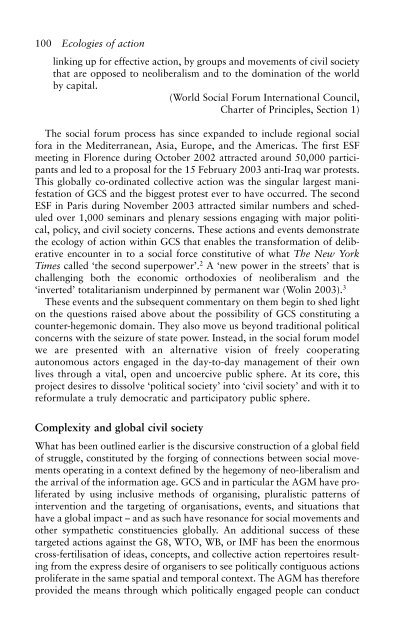Complexity and Social Movements: Multitudes at the Edge of Chaos ...
Complexity and Social Movements: Multitudes at the Edge of Chaos ...
Complexity and Social Movements: Multitudes at the Edge of Chaos ...
You also want an ePaper? Increase the reach of your titles
YUMPU automatically turns print PDFs into web optimized ePapers that Google loves.
100 Ecologies <strong>of</strong> action<br />
linking up for effective action, by groups <strong>and</strong> movements <strong>of</strong> civil society<br />
th<strong>at</strong> are opposed to neoliberalism <strong>and</strong> to <strong>the</strong> domin<strong>at</strong>ion <strong>of</strong> <strong>the</strong> world<br />
by capital.<br />
(World <strong>Social</strong> Forum Intern<strong>at</strong>ional Council,<br />
Charter <strong>of</strong> Principles, Section 1)<br />
The social forum process has since exp<strong>and</strong>ed to include regional social<br />
fora in <strong>the</strong> Mediterranean, Asia, Europe, <strong>and</strong> <strong>the</strong> Americas. The first ESF<br />
meeting in Florence during October 2002 <strong>at</strong>tracted around 50,000 participants<br />
<strong>and</strong> led to a proposal for <strong>the</strong> 15 February 2003 anti-Iraq war protests.<br />
This globally co-ordin<strong>at</strong>ed collective action was <strong>the</strong> singular largest manifest<strong>at</strong>ion<br />
<strong>of</strong> GCS <strong>and</strong> <strong>the</strong> biggest protest ever to have occurred. The second<br />
ESF in Paris during November 2003 <strong>at</strong>tracted similar numbers <strong>and</strong> scheduled<br />
over 1,000 seminars <strong>and</strong> plenary sessions engaging with major political,<br />
policy, <strong>and</strong> civil society concerns. These actions <strong>and</strong> events demonstr<strong>at</strong>e<br />
<strong>the</strong> ecology <strong>of</strong> action within GCS th<strong>at</strong> enables <strong>the</strong> transform<strong>at</strong>ion <strong>of</strong> deliber<strong>at</strong>ive<br />
encounter in to a social force constitutive <strong>of</strong> wh<strong>at</strong> The New York<br />
Times called ‘<strong>the</strong> second superpower’. 2 A ‘new power in <strong>the</strong> streets’ th<strong>at</strong> is<br />
challenging both <strong>the</strong> economic orthodoxies <strong>of</strong> neoliberalism <strong>and</strong> <strong>the</strong><br />
‘inverted’ totalitarianism underpinned by permanent war (Wolin 2003). 3<br />
These events <strong>and</strong> <strong>the</strong> subsequent commentary on <strong>the</strong>m begin to shed light<br />
on <strong>the</strong> questions raised above about <strong>the</strong> possibility <strong>of</strong> GCS constituting a<br />
counter-hegemonic domain. They also move us beyond traditional political<br />
concerns with <strong>the</strong> seizure <strong>of</strong> st<strong>at</strong>e power. Instead, in <strong>the</strong> social forum model<br />
we are presented with an altern<strong>at</strong>ive vision <strong>of</strong> freely cooper<strong>at</strong>ing<br />
autonomous actors engaged in <strong>the</strong> day-to-day management <strong>of</strong> <strong>the</strong>ir own<br />
lives through a vital, open <strong>and</strong> uncoercive public sphere. At its core, this<br />
project desires to dissolve ‘political society’ into ‘civil society’ <strong>and</strong> with it to<br />
reformul<strong>at</strong>e a truly democr<strong>at</strong>ic <strong>and</strong> particip<strong>at</strong>ory public sphere.<br />
<strong>Complexity</strong> <strong>and</strong> global civil society<br />
Wh<strong>at</strong> has been outlined earlier is <strong>the</strong> discursive construction <strong>of</strong> a global field<br />
<strong>of</strong> struggle, constituted by <strong>the</strong> forging <strong>of</strong> connections between social movements<br />
oper<strong>at</strong>ing in a context defined by <strong>the</strong> hegemony <strong>of</strong> neo-liberalism <strong>and</strong><br />
<strong>the</strong> arrival <strong>of</strong> <strong>the</strong> inform<strong>at</strong>ion age. GCS <strong>and</strong> in particular <strong>the</strong> AGM have prolifer<strong>at</strong>ed<br />
by using inclusive methods <strong>of</strong> organising, pluralistic p<strong>at</strong>terns <strong>of</strong><br />
intervention <strong>and</strong> <strong>the</strong> targeting <strong>of</strong> organis<strong>at</strong>ions, events, <strong>and</strong> situ<strong>at</strong>ions th<strong>at</strong><br />
have a global impact – <strong>and</strong> as such have resonance for social movements <strong>and</strong><br />
o<strong>the</strong>r symp<strong>at</strong>hetic constituencies globally. An additional success <strong>of</strong> <strong>the</strong>se<br />
targeted actions against <strong>the</strong> G8, WTO, WB, or IMF has been <strong>the</strong> enormous<br />
cross-fertilis<strong>at</strong>ion <strong>of</strong> ideas, concepts, <strong>and</strong> collective action repertoires resulting<br />
from <strong>the</strong> express desire <strong>of</strong> organisers to see politically contiguous actions<br />
prolifer<strong>at</strong>e in <strong>the</strong> same sp<strong>at</strong>ial <strong>and</strong> temporal context. The AGM has <strong>the</strong>refore<br />
provided <strong>the</strong> means through which politically engaged people can conduct




